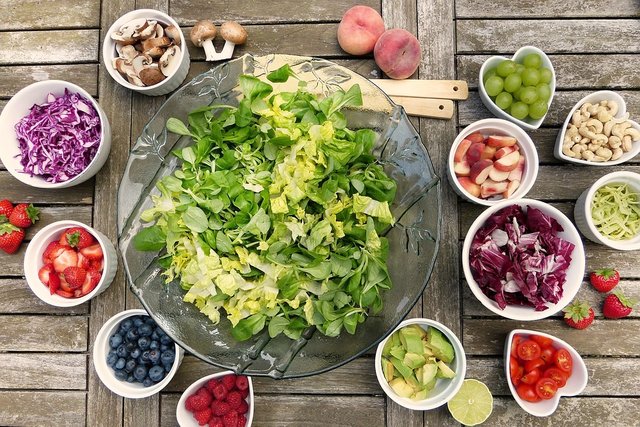Nutrition and Bone Strength for Women
The impact of nutrition on bone density goes far beyond simply getting enough calcium. Many different vitamins and minerals impact bone health.
Many women face concerns about bone loss, especially as they get older and the risk of osteoporosis rises. Getting the right nutrients when you are young can help prevent the loss of bone density as you age, but even the bones of older women can benefit from a healthy diet full of bone-boosting vitamins, minerals and phytochemicals.

Source: Pixabay.com
Calcium and Bones
Calcium gets the most press as a bone-boosting mineral, and for good reason. Deficiencies can lead to osteoporosis and a loss of bone density. Women between 19 and 50 require 1,000 mg of calcium daily. The requirement rises to 1,300 mg daily for those over 50. Many foods contain calcium, but milk is probably the most well-known source. Other dairy products, such as yogurt and cheese, and leafy green vegetables, such as Swiss chard and spinach, also contain high levels of calcium. Consuming canned sardines or salmon with bones can also boost your calcium intake. If you take a calcium supplement, take only 500 mg at a time, since the body cannot effectively absorb more than that.
Phosphorus to Build Bone
Phosphorus works with calcium to build hydroxyapatite, a vital structural component of bone. Women over 19 should get 700 mg of phosphorus per day. Most foods have some level of phosphorus, including dairy, meat, bread, nuts and cola. Too much phosphorus, over about 3,000 mg a day, can be detrimental to bone health, but high calcium levels, over about 2,000 mg per day, can mitigate this effect.
Vitamin D Works With Calcium
Vitamin D is necessary for bones to properly absorb calcium. However, controversy exists about exactly how much vitamin D you need. The National Osteoporosis Foundation recommends 400 to 800 IU per day for women under 50, and 800 to 1,000 IU per day for older individuals. Some scientists and doctors support a much higher intake, up to 2,000 IU per day. The skin can also create vitamin D when exposed to sunlight, so some individuals may get enough simply from spending time outdoors.
Magnesium for Bone Health
According to the Linus Pauling institute, over 60 percent of the body’s magnesium is found in the skeletal bones, indicating its importance for bone health. A deficiency of magnesium can result in lower levels of calcium in the bloodstream and an increased resistance to the effects of vitamin D and parathyroid hormone, which is important in bone maintenance. Women between 19 and 30 need 310 mg a day, and women over 30 should get 320 mg daily. Foods high in magnesium include cantaloupe, honeydew melon, lima beans, avocado, banana, nectarine, potato, spinach, milk and orange juice.
Vitamin K and Bone
Vitamin K operates in bones to promote the binding of calcium to osteoblasts, the cells that incorporate calcium to build bone. Few studies have been done on vitamin K and bone health, but one study in the American Journal of Clinical Nutrition did find an association between low levels of vitamin K in the diet and low bone mineral density in women. Women need 150 to 500 mcg of vitamin K every day. Green vegetables, including broccoli, asparagus, spinach, lettuce and cabbage, have high levels of vitamin K. Low-fat dairy is another source.
Soy Isoflavones Effect on Bones
Soy isoflavones are a type of phytochemical found in soy products such as soy milk, tofu and edamame. They operate as estrogen mimics, binding to sites within cells where estrogen normally binds. In some cells, this can prevent normal estrogen from binding, while in others it boosts the activity of the receptor. Some studies, including a report in the journal Maturitas and a Journal of Clinical Endocrinology and Metabolism study, indicated that soy isoflavones in the diet can help preserve bone mineral density in older women. No specific minium dosage of soy isoflavones has been established.
While less studied, some research indicates that zinc, vitamin C and omega-3 fats may also impact bone health. Exercise, supplements and vibration therapy are some other natural ways to build bone strength.
In most cases, getting the nutrients from whole foods that you need to protect bone health is better than getting them in supplement form. The nutrients in food interact with one another to provide the most benefits, and whole foods may contain other components, such as fiber and phytonutrients, that may have beneficial effects that are yet undiscovered.
Resources:
University of Maryland Medical Center: Osteoporosis
Newton KM, et al; "Soy protein and bone mineral density in older men and women: a randomized trial"; Maturitas
Chen YM, et al.; "Soy isoflavones have a favorable effect on bone loss in Chinese postmenopausal women with lower bone mass: a double-blind, randomized, controlled trial"; J Clin Endocrinol Metab.
Linus Pauling Institute: Magnesium
Linus Pauling Institute: Phosphorus
Booth, et al.; "Vitamin K Intake and Bone Mineral Density in Women and Men"; American Journal of Clinical Nutrition
Office of Dietary Supplements: Vitamin D
Thanks for using eSteem!
Your post has been voted as a part of eSteem encouragement program. Keep up the good work! Install Android, iOS Mobile app or Windows, Mac, Linux Surfer app, if you haven't already!
Learn more: https://esteem.app
Join our discord: https://discord.gg/8eHupPq